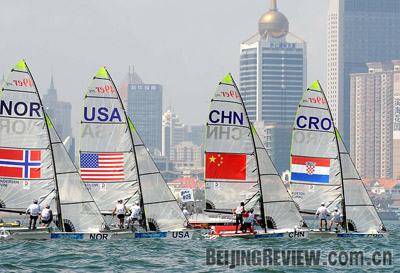|
|

|
|
SAIL TO SAIL: Ships compete in the Olympic 49er class sailing event in Qingdao on August 10 |
Athens silver medalist Yin Jian nearly caused a riot on August 20 when she won China's first and only Olympic sailing gold medal in the Beijing Olympics. A roar went up from fans lining the viewing wall just outside the venue in Qingdao, the coastal resort in east China's Shandong Province, when they realized Yin had won gold.
China's last gold medal in sailing was won by Hong Kong's female windsurfer Lee Lai-shan in the 1996 Atlanta Olympics.
China has also won two Olympic sailing silver medals, with Zhang Xiaodong in Barcelona in 1992 and Yin in Athens in 2004 and a bronze in the Laser Radial by Xu Lijia on August 19.
Sailing was first contested as an Olympic sport in Paris in 1900. Races are held in what is known as fleet racing format: fleets of equally matched boats racing around the same course area at the same time. The boats race around courses, which incorporate a variety of different sailing angles-upwind, downwind and reaching. Races are scheduled to last between 30 and 75 minutes depending on the event. Scores are awarded according to finishing positions in each race. Only one team from each country can qualify for each of the Olympic sailing events.
From August 9 to 21, some 400 sailors from 62 countries and regions competed for altogether 11 gold medals in Qingdao. Britain was the biggest winner with four gold medals, while Australian sailors walked away with two, and China, Denmark, the United States, New Zealand and Spain each won one.
Hospitality
When Olympic tourists and sailing fans flocked to Qingdao, they were impressed with friendly people, beautiful beaches on the First Bathing Beach, interesting European-style architecture in the Badaguan area and enthusiastic Chinese audiences cheering for medals for the home team.
Altogether 13,760 volunteers from all walks of life offered help on the streets, emergency aid and language services in Qingdao.
A multilingual call center was set up in the city to provide language services for tourists around the clock. A hundred volunteers at the call center, which is in operation from the end of July to the end of September, answer calls in English, Japanese, Spanish, Korean, French, German and Russian.
Wang Jiangong, Director General of the city's tourism bureau, told China Daily, that the Olympic regatta would attract more visitors by promoting the city's reputation worldwide.
| 